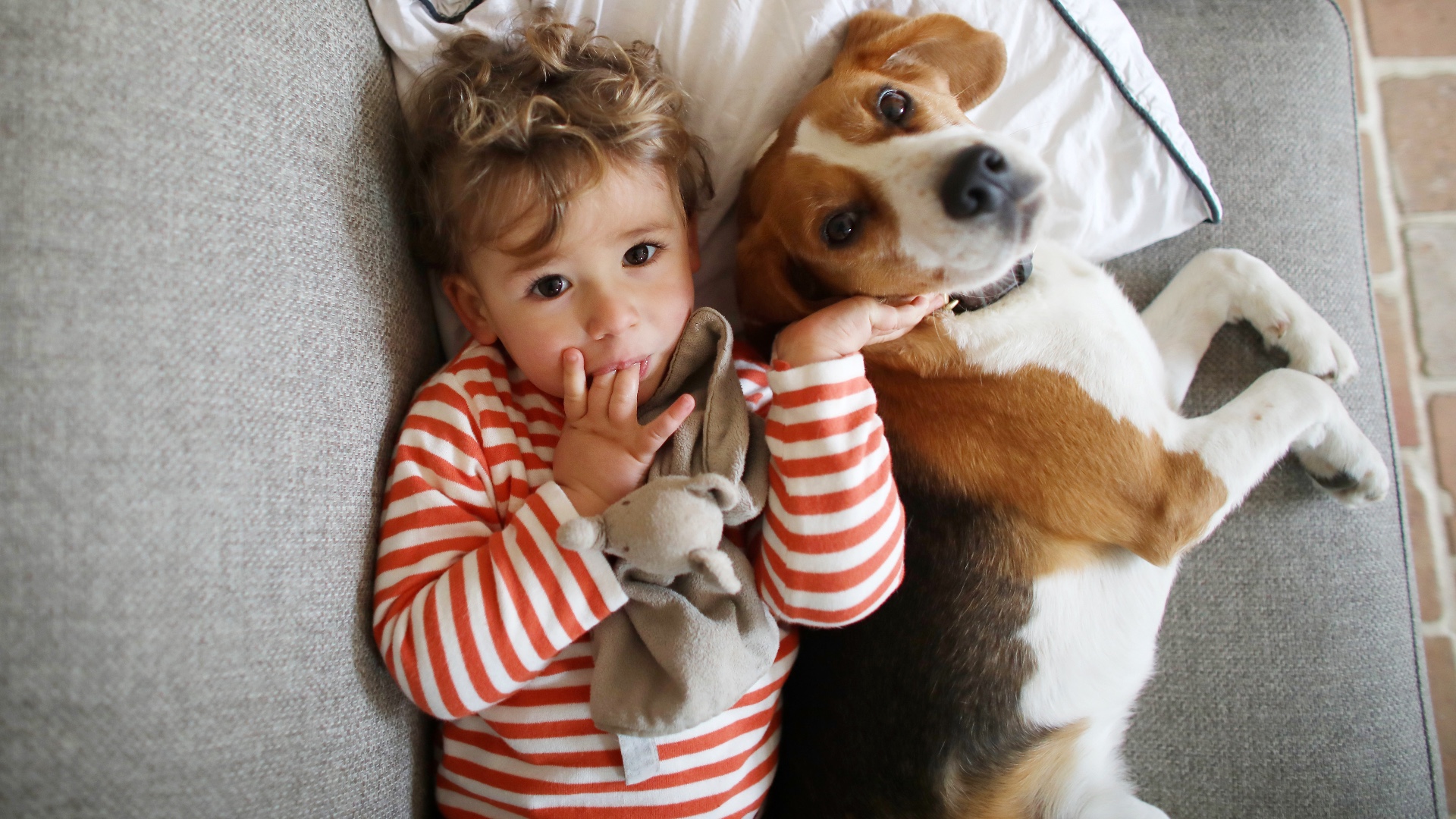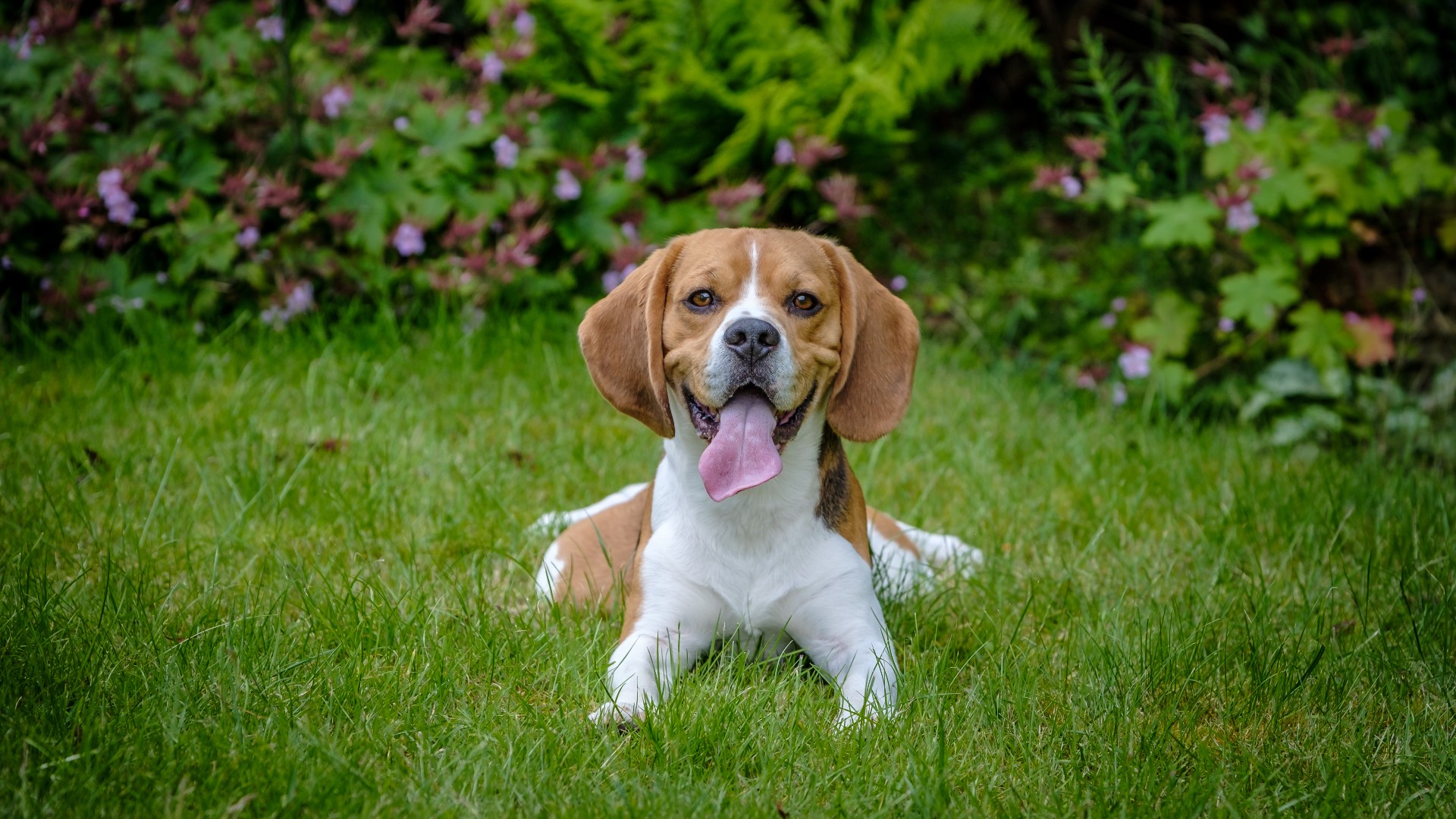Beagle: Breed profile
Excitable yet gentle, the loving and adventurous Beagle makes the perfect companion for active individuals and families

With their floppy ears and big puppy dog eyes, it's hard not to fall in love with a Beagle. This British dog breed was originally bred as scent hounds, they have one of the most sensitive noses of all dogs, which makes them an excellent hunting dog breed and one of the best tracking dogs. But while this ensures they are popular among hunters it also means they are amazing sniffer dogs, helping the authorities to identify contraband food and illegal drugs.
They also make amazing pets, although their super-sniffing abilities can make them a bit of a handful. Their amazing levels of energy mean they adore being on the go and their low boredom threshold means owners need to keep stimulating them mentally for fear they'll decide to make a run for it. Not that they don't like being around people: they absolutely adore humans. Loyal and friendly, they'll love you as much as you love them.
Beagles come in two sizes: 13 inches and 15 inches. Most of them are black, brown and white although some are red, white, lemon and even blue! There are also many famous Beagles out there, from those that have appeared in films to those owned by pop stars such as Bob Dylan. Some are animated, including Snoopy in Peanuts and Odie in Garfield. But should you get one yourself? Let's take a look.
How much exercise does a Beagle need?
Life expectancy: 12 -15 years
Average weight: Male: 24lbs/11kg Female: 22lbs/10kg
About the same as: A car tire
Beagles are bundles of energy and they ideally require about 90 minutes of daily exercise as adults, preferably spread over two sessions. Since they have a lot of stamina, Beagles can keep going all day so ensure the walks are conducted at a brisk pace or else you may fail to satisfy their need to keep active.
It's also important to step things up once or twice a week by engaging the breed in some cardio exercises. The aim is to get their heart pumping and you can do this by having them accompany you on a run or letting them go for a swim. By engaging in lots of play such as tug-of-war, fetch, hide-and-seek or even setting up an obstacle course, you'll also be keeping Beagles moving. Mental stimulation is vitally important but just be wary when they're off their lead. If they catch a scent, they're likely to dart away.
Thankfully, you don't need to hit the ground running when it comes to exercise. You should take more care when they're puppies and gently ease them into an exercise regime. Just keep an eye on a Beagle during these sessions and if they begin to pant or look like they may start to struggle, you should stop. You should also take advantage of your yard but make it secure because Beagles are Houdini-like and they will find a way out.
Are Beagles easy to train?
Suitable for: Anyone who wants an active dog
Not suitable for: People with little time for training
Temperament: Excitable, gentle, stubborn
Shedding: Low
Unfortunately, Beagles are not the easiest dogs to train. In fact, they're notoriously difficult because, aside from having huge amounts of energy, their sensitive nose makes them massively inquisitive so they will tend to become distracted. You're going to have to be very patient and creative to get them into line and even when you think you've cracked it, you may find the effects are only temporary. Beagles are independent, shall we say, and more than a little stubborn. Crate training is a must!
Get the best advice, tips and top tech for your beloved Pets
That said, it's not an impossible task. Experienced dog owners may have an easier time of it but if you can find the right motivation then you'll be on the right track even if you're a novice. As we saw when exercising, you may be better keeping a Beagle on a lead but do consider their urge to sniff when you're training and work hard on recall training. Certainly, keep obedience training going throughout the day and establish your authority. Don't shout, though. Be calm and consistent and you should get there.
Are Beagles good with kids?

Yes. Beagles are great with children and if you socialize a Beagle from a young age, they will have very few problems slotting into family life. They love to play and they're very sweet-natured which means they'll fast become a wonderful child companion.
The breed will be a natural playmate, appealing to any child's mischievous side given how naughty Beagles can be. They make for decent watchdogs as well and will look out for a child, seeing them as one of the pack.
What do Beagles eat?
Beagles love food and they'll eat in abundance – so much so that if you left them to their own devices, there is every chance they won't want to stop. As a hound breed, they're hardwired to sniff and scavenge so you have a responsibility to ensure they remain healthy. That means keeping them well-fed twice a day with the best dry dog food and removing temptations such as a prime piece of steak sitting on the countertop and even rubbish bins left with their lid off.
There is no harm in giving Beagles treats as a reward, though, and these will become crucial during training. Just be sure that they don't comprise more than 10 percent of the dog's overall diet. Be respectful, too, when a Beagle is eating and try to feed them at the same time each day so that they'll better understand that food is coming. The key is to prevent them from becoming obese – easier said than done.
Do Beagles bark a lot?
Yes. Beagles can be very loud and they are often said to be the most vocal of breeds. Much of that is due to them being bred to bark, bray and howl to alert hunters when they catch a whiff of an animal they are pursuing.
As such, their tendency to be vocal may not be ideal if you live in a house with thin walls and close neighbors. Beagles will bark when someone comes to the door or if they want to grab your attention. They'll also howl if they are alone or start becoming restless and bored.
This means you need to find ways of stimulating and occupying them when you are away. Ignoring the barking can help. Rewarding a dog when they stop barking is also useful.
Are Beagles aggressive?

Beagles are not aggressive dogs but there are circumstances when they may become ill-tempered. In that sense, they are not unlike many breeds and if you do see signs of aggression then you must work out what is causing it.
They may be experiencing fear or anxiety. They may also be perceiving a threat, such as a new pet or over-enquiring children poking and prodding a bit too much. Beagles can be possessive around their food, toys and favorite spots and they will become irritable when they're feeling pain. With solid training, plenty of exercise and respect, however, you'll have few problems.
Do Beagles shed a lot?
Amount of shedding: Low
Easy to groom: Yes
General health: Good
Potential for weight gain: High
Beagles have short coats but they do shed, especially in the Spring. Grooming is a doddle, though: just use a medium-bristle brush on their coat once a week to remove the excess hair and give them a bath very infrequently – usually if they've become excessively dirty during a walk. Other than that, make sure their ears don't show signs of infection, trim their nails and clean their teeth.
Wisdom Panel Breed Discovery DNA Kit | Amazon
Not sure exactly what breed your dog is? This kit screens for 365+ breeds – because knowing every detail about your dog helps you understand how best to care for them.
Beagle health problems
Obesity is a big problem with Beagles yet it's one that can be prevented with care. We know it's hard to resist a Beagle's soulful eyes so there's a big temptation to give these cute pooches lots of food. But this can cause a lot of harm to their heart, back and digestive system.
Beagles also commonly suffer from Intervertebral Disc Disease and a bleeding disorder called hemophilia. But general grooming and regular vet checkups will head off many problems so keep their teeth clean, watch out for infections and parasites, and invest in the best pet insurance for added peace of mind.
That said, Beagles are among the dog breeds that live the longest, with a life span of up to 15 years.
Should I get a Beagle?
Beagles aren't generally the best for novice dog owners because they require a lot of training. They're not a brilliant breed if you are time-poor or don't fancy keeping them fit every day. But if you're looking for a cute, fun and playful buddy who will easily slot into an energetic lifestyle and your family's life, then Beagles should be very high on the list. They require minimal grooming, they're ultra-friendly and will keep you on your toes. They live life as it should be lived.
Not got enough of beagles just yet? Here are 10 fascinating Beagle facts you need to know

David Crookes has been a journalist for almost 30 years and he has written for a host of magazines, newspapers, websites and books including the World of Animals Annual, BBC Earth, Live Science, The Independent and Tom’s Guide.
Born in England, he lives with two cats but he’s also keenly interested in the differences between the huge number of dog breeds – in fact, you can read many of his breed guides that he’s written in collaboration with vets here on PetsRadar.
With a lifelong passion for technology, too, he’s always on the lookout for useful devices that will allow people to keep their pets happier and healthier, and provide them more time to spend together.
David has a degree from Durham University, as well as postgraduate diploma in journalism from the University of Central Lancashire.

